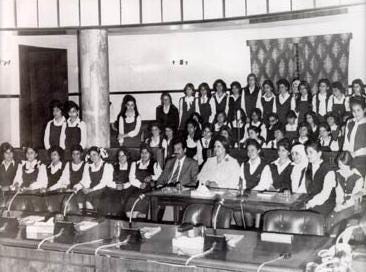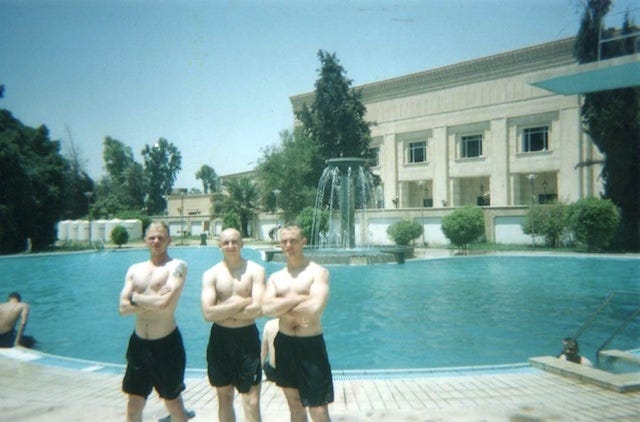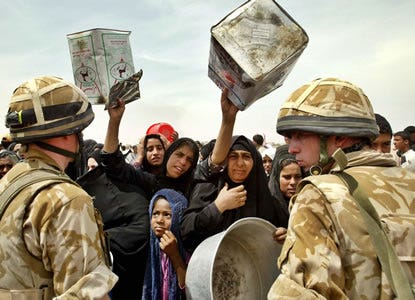War: Business as Usual
Too many Americans don't understand the horrors of US regime-change operations.
Last week on Democracy Now, NY congressional Representative Alexandra Ocasio-Cortez answered a question about potentially sending troops to Haiti. Her mealy-mouthed answer about "exit plans" made it painfully clear that she does not understand what every US intervention entails.
She is not alone. On social media, I see too many Americans who support destabilizing regime-change operations after they hear the usual "atrocity propaganda." Today, we examine the consequences and look at what really happens.
Between the Tigris and the Euphrates, Iraq gave birth to civilization.
Civilization is very fragile. It took 5000 years to build their civilization, but within days it crumbled. Without a state apparatus to maintain it, even the most basic aspects of civilization went awry.
On March 21, 2003, after a series of lies, threats and with permission from the Democrats, the US began its campaign in Iraq. Almost every building that the Bush regime deemed "a vital target" was hit. Just that night over 1300 missiles and bombs were dropped in Baghdad. Simultaneously, from Kuwait and Jordan, US marines began a land invasion campaign where they were only 200 miles away from Baghdad. On that day, the US stock market closed with its best weekly performance since 1982. War is indeed good for business.
The first order that the Bush regime gave was the "De-Ba'athification"order. Everyone who worked for the previous government stopped coming to their jobs. This included post office employees, school teachers, city sweepers and garbage collectors. The commander of V Corps, LTG William S. Wallace explained:
When we arrived in Baghdad, everybody had gone home. The regime officials were gone; the folks that provided security of the ministry buildings had gone; the folks that operated the water treatment plants and the electricity grid and the water purification plants were gone. There were no bus drivers, no taxi drivers; everybody just went home. I for one did not anticipate our presence being such a traumatic influence on the entire population. We expected there to be some degree of infrastructure left in the city, in terms of intellectual infrastructure, in terms of running the city infrastructure, in terms of running the government infrastructure. But what in fact happened, which was unanticipated at least in [my mind], is that when [we] decapitated the regime, everything below it fell apart.
The initial airstrike destroyed about 40% of Baghdad's water system (the pipes that took the water from the water towers into people's homes). Water that once flowed through the kitchen faucet is no longer available. Nothing comes out. The next day, the temperature in Baghdad went up to 30 degrees Celsius (86 degrees Fahrenheit). All the bottled water was sold out before the invasion. In this scorching heat, people are forced to go to the nearest source to fetch water. Unfortunately, in Baghdad, one of the sewage facilities was also damaged and they were forced to dump thousands of gallons of sewage into the river.
Within the next week, the haphazard bombing campaign destroyed major water processing plants all over the country. In the city of Basra, the damage to the electric grid forced a water treatment facility (which takes water from the river and purifies it to be potable) to shut down. Immediately, 1.5 million citizens had no access to clean water. Thanks to drinking dirty water, for the first time since 1950s, Iraq had major outbreaks of both cholera and typhoid.
Oddly enough, before the people of Iraq got water to drink, the oilfields of Rumaila were back up and running ahead of schedule! Hence, one can rule out incompetence. It was clearly indifference on the part of the Bush regime.
The US government had already given Bechtel a contract for "waste water and municipality treatment." This deal was ripe with conflicts of interests that you can learn more about here. The US government had privatized water. As we know from Bechtel's previous behavior, even after water was restored to some areas months later, the price had skyrocketed.
Iraq had a functioning garbage collection system since ancient Mesopotamia. Prior to the invasion, Baghdad had over 1700 trucks to collect garbage and dispose of the waste. Many were destroyed. Some did not have fuel to operate and others were cannibalized for parts. The garbage went uncollected and it soon started to pile up around the streets. The once pristine streets of Baghdad were filled with garbage.
The initial bombing campaign also destroyed most of the electric stations. In Baghdad alone, nearly 5 million residents lost electricity. This also meant that any food stored in refrigerators would start rotting very quickly. In normal times, one would just go to a grocery store to buy more food. Unfortunately, the grocery stores were also not open during this time. As for food, most Iraqis in Baghdad didn't have any. One US marine recounts the hunger he witnessed in painful detail.
As the bombing campaign continued, the hospitals went dark. They had used up all the fuel they had on the back-up generators. This is the minute that everyone who is on a ventilator or a pacemaker died while the medical staff watch helplessly. According to a report, even by 2016 (thirteen years later) most of the healthcare facilities do not have all their previous equipment restored
The bombing campaign also meant that more people needed medical treatment but there were fewer hospitals and doctors to treat them. The ones that were around, didn’t have antibiotics According to one doctor, 80% of the patients left with infections they did not have when they came to the hospitals. Another doctor explained how blood was in such short supply that physicians donated their own blood to the patients. Some hospitals had to "make do" without anesthesia. Imagine if you were shot and the doctor had to operate on you without anesthesia.
If there is one thing you expect Iraq to have, it's an abundance of is oil. Unfortunately, while the oil fields were up and running in the south, somehow the infrastructure had not been restored for Iraqis to get gasoline. In fact, the US government had to ration gasoline.
The cascading effects of the gasoline shortage was felt throughout society. Already harvested food could no longer be sent to those in the cities. People went hungry while the food rotted. Later that year, statistics said nearly 60% of the population under food insecurity. Eventually, the occupying forces did deliver food, but people had to line up hours for rations of basics such as wheat, flour and soap.
Over 60% of Iraqis became jobless. Many were desperate. One man who worked as a welder with a middle-class lifestyle was forced to take up a job that paid him only $1.25 a day. Everyone's wages went down due to desperation.
Poverty and desperation affected Iraq’s children the most. Under Saddam Hussein, Iraq spent six percent of its GDP and 20 percent of its overall budget on schools, teachers and literacy programs.
In 1987, Iraq's literacy went up to 80%. Primary school enrollment was at nearly 100%.
However, the De-Ba'athification order meant that all the public school teachers and many university teachers were fired from their jobs. The schools closed. Nearly 1.3 million children had to work because of extreme crippling poverty caused by the US policies after war.
But by the winter this year, 13-year-old Zaineb had to leave school to stay home with two younger children while her mother worked. Asked if she missed school, Zaineb, a quiet girl with a heart-shaped face, turned away to busy herself with her baby sister and cried quietly. ''She's very smart,'' said Ms. Abdul-Zahra, wiping the tears from her own eyes. ''I didn't want her to leave school.''
In 2012 – the last year for which there are reliable attendance data – only 53 percent of boys and 45 percent of girls finished secondary school. Even after the handover to Al-Maliki, school spending never went past 6% of the GDP. A later survey showed that Iraq needed 9000 more schools to reliably educate its population. Perhaps the best metaphor for the state of the Iraq education is this picture from May 2003 where a school building was turned into a makeshift morgue.
Before Abu Ghraib became infamous for its torture and prison, the area housed Iraq's largest seed bank and plant breeding program with thousands of seed varieties from ancient wheats, chickpeas, fruits and legume. The occupation destroyed the seed bank and with it, the world may have lost many important seeds forever.
While the US government created a huge publicity stunt about giving aid to Iraqi farmers, reality was much darker. In May 2003, Paul Bremer became the head of the US occupation in Iraq. He set up headquarters in the "Green Zone" where Iraqis were barred from entering. In the Green Zone, westerners had food, drink, ice-cream, prostitutes and more.
From the palatial comforts in the Green Zone, Paul Bremer issued Order 81 entitled “Patent, Industrial Design, Undisclosed Information, Integrated Circuits and Plant Variety Law.” Previously, under Saddam Hussein, patents for living organisms were banned. Order 81 created patent rights for living organisms and biomatter.
According to Dr. Dahlia Wasifi, an Iraqi-American who explained the situation in her 2008 speech, “Before 2003 they had a well functioning, centrally-controlled seed industry that had developed over the years a rich seed variety for almost variation of wheat in the world today."
"The agribusiness giant’s choice of seeds exacerbated the food crisis in Iraq. They gave Iraqi farmers six types of wheat to grow, only six. Three of them are for wheat for pasta. Iraqis don’t eat pasta.” She continued.
It was predatory: “So, a population that is starving to death is given seeds to make half of their production for exports. Who is going to make money off of that? Not Iraqis.”
Dr. Wasfi finally ended with “This means starvation, which pushes people to be dependent on any crumbs the corporations hand to them.”
While the media published mountains of incredulous lies about Saddam Hussein's non-existent human shredders, none of them took the time to explain the basic truth of how Iraqis didn’t have food, water and electricity.
Later, the media spoke about the "botched invasion" unfortunately, even this is not true. The invasion served its purpose. Bush's donors, got their lucrative contracts to extract Iraq's natural resources. Iraq still has not recovered to the position it was from 2002. The man who helped tear down Saddam Hussein’s statue, now says he wishes could have Saddam Hussein back.
All of this is excluding the gratuitous violence and sadism inflicted upon the Iraqis. There was plenty of that.











Omg. 🥺😥
It's hard to read this important report. Made me cry. Iraq was a highly developed country, destroyed by the US. And still wars for profit continue everywhere.